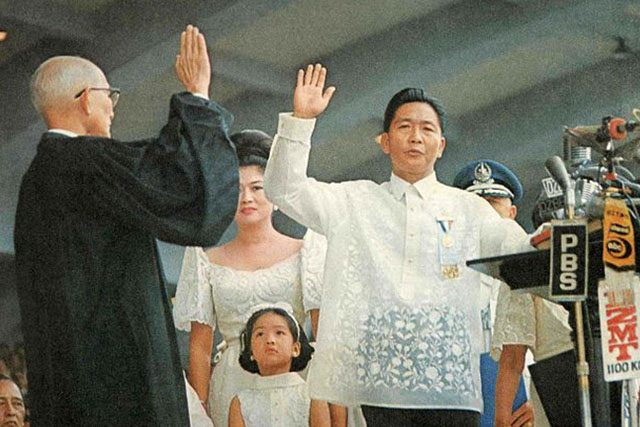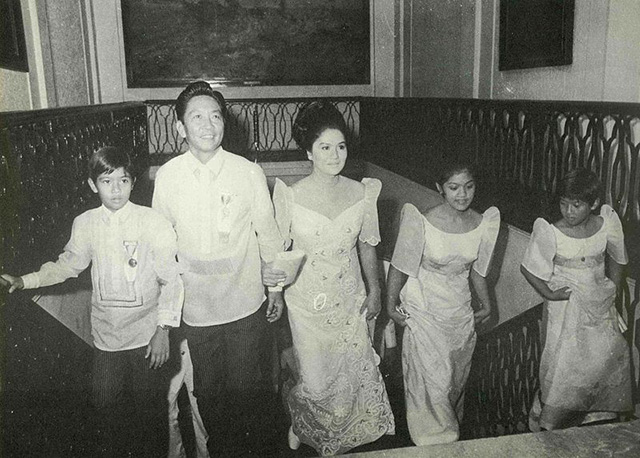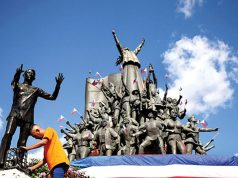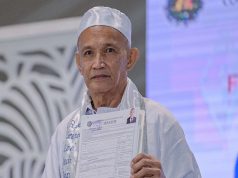
(Updated Oct. 28, 2020; 10:48 p.m.) Cries against historical revisionism were renewed after a Senate panel endorsed the bill that seeks to formally commemorate ousted dictator Ferdinand Marcos Sr‘s birthdate on his family’s bailiwick.
The Senate committee on local government Monday approved House Bill No. 7137 from the lower chamber which aims to declare September 11 a special non-working holiday in observance of the “President Ferdinand Edralin Marcos Day” in Ilocos Norte.
While approved, the bill is still reportedly subject to some “wordings” of a technical working group tasked to reconcile the different versions of the chambers and to request for position papers from resource persons.
Media reports earlier reported that eight senators voted for its approval. Reports named Senators Francis Tolentino, Sherwin Gatchalian, Cynthia Villar, Bong Go, Bato dela Rosa, Joel Villanueva, Nancy Binay and Imee Marcos, the daughter of the late dictator.
However, on Wednesday, Binay clarified that she did not vote for the approval of the bill.
“I had to leave the hybrid hearing of the Senate committee on local government after the discussion on the re-districting of the province of Bulacan due to a prior commitment. Thus, I was no longer a part of the hearing when House Bill 7137 was tackled and discussed,” Binay said in a statement.
“I wish to reiterate that I did not vote for the approval of the bill and will not support any bill that would cause historical revisionism,” she added.
Contrary to reports circulating online, I did not vote for the approval of House Bill No. 7137 which aims to declare September 11 a special non-working holiday in observance of “President Ferdinand Edralin Marcos Day” in Ilocos Norte. pic.twitter.com/giZ0dIJATy
— Senator Nancy Binay (@SenatorBinay) October 28, 2020
Gatchalian also released a statement denying he voted for the approval of the proposed “Marcos Day” in Ilocos Norte.
I did not vote for the approval of the proposed Marcos Day in Ilocos Norte contrary to what some media organizations published. pic.twitter.com/EJaZAIMwq3
— Win Gatchalian (@WinGatchalian74) October 28, 2020
Meanwhile, Sen. Kiko Pangilinan, a committee member, questioned the need for the bill when Congress in 2013 had enacted the Human Rights Compensation Measure aiming to recognize the “widespread abuse and atrocities” committed during that period.
“It would be inappropriate to honor a tyrant and a thief,” he reportedly said in a statement.
Pangilinan also asked why the bill was being pushed in the middle of an ongoing pandemic brought by the coronavirus disease.
Some Filipinos echoed his sentiments and accused the government of “being the biggest revisionist of all” through the initiative.
“Napaka-helpful ng mga Senators na ito. Alam talaga nila kung ano ang priorities ng Pilipinas sa panahon ng krisis. Sulit ang taxpayers’ money,” a Twitter user quipped with sarcasm.
“Harap-harapang historical revisionism. Si Marcos ay diktador. Si Marcos ay mamamatay-tao. Kailanman, hindi tama ang ipagdiwang ang kapanganakan ng isang mamamatay-tao. Nothing to celebrate about the life of a dictator who ended the lives of many. Nakakahiya. Ulyanin,” another online user responded to the news.
Others called it an “irony” and cited the existence and purpose of the historical People Power Revolution that toppled the Marcos regime through non-violent means.
“We celebrate the day he was overthrown and now we celebrate his birth (in some areas)? The irony!” a Twitter user exclaimed.
“Is February 25 a joke to them????? What’s the purpose of celebrating the People Power Anniversary kung may holiday ang dictator???? Also, ang disrespectful nito sa victims during his era!!” another online user wrote.
The peaceful revolution is celebrated every February 25 which commemorates the uprising that led to the ouster of the late president and his eventual exile to Hawaii.

“We have a law that gives reparations to victims of the Martial Law. Now the legislation is pushing to venerate the person who caused the damage. Only in the Philippines,” a Twitter user said with a shrugging emoji, citing Republic Act 10368.
The law formally recognizes “the sacrifice and heroism of all Filipinos who were victims of summary execution, torture, enforced or involuntary disappearances and other gross human rights violations” under the Marcos regime through monetary and non-monetary reparations.
Last September, majority of the House of Representatives voted in favor of the bill that was primarily authored by Rep. Angelo Marcos Barba (Ilocos Norte, Second District) who is Marcos’ nephew, Rep. Rina Fariñas (Ilocos Norte, First District) and Rep. Rudys Caesar Fariñas (Probinsyano Ako party-list).
Barba justified the bill by claiming that Marcos laid the
“foundation for nation-building” and that the Philippines was “ahead of our time,” supposedly in terms of agriculture, education, infrastructure, energy production, and foreign policy.
The Fariñases additionally claimed that the dictator supposedly displayed extraordinary memory and brilliance and had topped the 1939 Philippine Bar examinations.
Marcos was born in Sarrat, Ilocos Norte on Sept. 11, 1917.
September, the month under which the bill seeks to honor his birthdate, is also the same month when he declared Martial Law which resulted in countless human rights violations.
Marcos’ Martial Law
Marcos’ regime was considered the country’s darkest years post-colonial period due to the curtailment of civil liberties, extrajudicial killings and unsolved disappearances, media oppression and economic recession, among others.
London-based human rights organization Amnesty International said that “some 70,000 people were imprisoned and 34,000 were tortured; over 3,200 people were killed” from 1972 to 1981, during the years that Martial Law was imposed.
Martial Law lasted for almost a decade which resulted in an “era of impunity” where activists, human rights defenders and mere civilians were arrested with the suspension of the writ of habeas corpus by emboldened uniformed personnel.
The period also saw the country mired with debt, which happened in part due to “a pattern of chronic borrowing, devaluation of the peso which bloated prices of goods, and reckless spending” of the regime.
RELATED: 31 YEARS OF AMNESIA: STORIES ON THE MYTHS THAT MADE MARCOS









